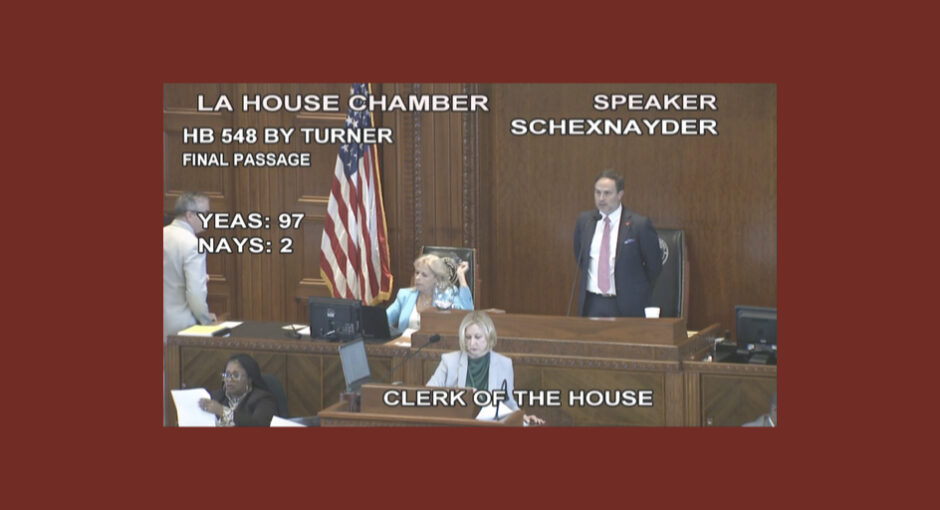The Louisiana House voted 97-2 yesterday to pass and send to the Senate legislation to stop drug manufacturer interference with 340B contract pharmacy arrangements. It also would prohibit pharmacy benefit manager and payor practices that lower reimbursement for 340B-purchased drugs.
HB 548 was referred to the Senate Health and Welfare Committee this morning. The House Health and Welfare Committee voted 14-0 on April 20 to pass it with just one amendment. That change deleted language that would have let 340B covered entities sue on their own behalf to get relief for alleged violations of the bill’s contract pharmacy provisions.
Pharmaceutical Research and Manufacturers of America is suing neighboring Arkansas in federal court over that state’s law, for now the only one of its kind nationally, that prohibits drug company policies that restrict provider access to 340B drugs when providers contract with outside pharmacies to dispense 340B drugs.
In a sign of how seriously PhRMA takes the Louisiana bill, it sent Corbin Santo, its deputy vice president and assistant general counsel, from his Chicago office to Baton Rouge last week to urge the House committee to reject HB 548.
“Unfortunately, more often than not, the 340B program of today is doing a disservice to [low income and vulnerable patients] and our broader healthcare system,” Santo told the committee. Recent research shows that 75% of Louisiana’s 340B disproportionate share hospitals provide charity care at levels below the national average, he said. PhRMA is committed to the 340B program “but we believe significant reform is needed to ensure that the program is benefiting the patients it is intended to serve,” Santo said. “This reform must occur at the federal level to address the systemic problems that have permitted the program to stray from its original intent.”
“PhRMA is committed to safeguarding and reforming the 340B program and supports efforts to ensure that it serves the communities that depend on it,” Santo said. “However, we believe this legislation in its current form will not further that goal.”
Elizabeth Davis, director of pharmacy and 340B compliance and audit at Tulane University School of Medicine, and Todd Eppler, CEO of DeSoto Regional Health System, a small rural disproportionate share hospital in Mansfield, La., were among those who spoke in favor of the bill.
Many hospital outpatient clinics that serve impoverished patients would not exist without 340B, Davis said. Tulane has five such clinics “and without 340B each would close because there is no other source of revenue to fund them,” she said. Tulane supports HB 548, she said, because it “would prevent pharmacy benefit managers, payers, and drug manufacturers from practices within the state that prevent 340B covered entities from realizing the benefit from the program.”
“Mom and Pop” Pharmacy Depends on 340B
Eppler said the owner of the “local mom and pop” independent pharmacy that DeSoto contracts with to dispense 340B drugs “has said he doesn’t believe they would be open today without this program. That’s a significant impact for a local community.”
HB 548 says “a manufacturer or distributor shall not deny, restrict, prohibit, or otherwise interfere with, either directly or indirectly, the acquisition of a 340B drug by, or delivery of a 340B drug to, a pharmacy that is under contract with a 340B entity and is authorized under such contract to receive and dispense 340B drugs on behalf of the covered entity,” unless the federal government prohibits such receipt. Nor shall a manufacturer or distributor “interfere with a pharmacy contracted with a 340B entity,” it says.
Limiting distribution of a potentially dangerous drug under a U.S. Food and Drug Administration Risk Evaluation and Mitigation Strategy “would not be construed as a violation,” the bill says.
Prohibited actions would violate the state unfair trade practices and consumer protection law. The Health and Welfare Committee amended the bill to clarify that covered entities and contract pharmacies would have no right to sue to manufacturers or distributors under the law.
HB 548 also would prohibit practices by pharmacy benefit managers, health insurance issuers, or other third-party payors that would indirectly lower covered entities’ reimbursement for 340B-purchased drugs.
PBMs and others could not:
- reimburse 340B covered entities at a lower rate than non-entities or lower reimbursement for 340B drugs
- impose discriminatory fees, charges, clawbacks, or other adjustments or assessments on 340B covered entities
- discriminate regarding participation in pharmacy networks, frequency of scope of audits, or patient choice where to receive drugs.
The bill says PBMs and others may not require covered entities to include modifiers on claims indicating that a drug is a 340B drug unless the U.S. Centers for Medicare & Medicaid Services or the state health department requires such identification for state Medicaid program purposes. Another passage says PBMs and others may not “require a 340B entity to reverse, resubmit, or clarify a claim after the initial adjudication unless these actions are in the normal course of pharmacy business and not related to 340B drug pricing.” Yet another passage says nothing in the bill “applies to the Louisiana Medicaid program as payor when Medicaid provides reimbursement for covered outpatient drugs.”


